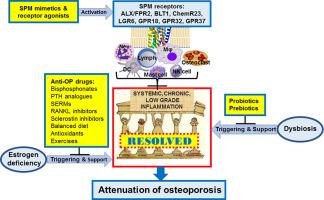Life Sciences ( IF 5.2 ) Pub Date : 2022-07-28 , DOI: 10.1016/j.lfs.2022.120847 Gregory Livshits 1 , Alexander Kalinkovich 2

|
Systemic, chronic, low-grade inflammation (SCLGI) underlies the pathogenesis of various widespread diseases. It is often associated with bone loss, thus connecting chronic inflammation to the pathogenesis of osteoporosis. In postmenopausal women, osteoporosis is accompanied by SCLGI development, likely owing to estrogen deficiency. We propose that SCGLI persistence in osteoporosis results from failed inflammation resolution, which is mainly mediated by specialized, pro-resolving mediators (SPMs). In corroboration, SPMs demonstrate encouraging therapeutic effects in various preclinical models of inflammatory disorders, including bone pathology. Since numerous data implicate gut dysbiosis in osteoporosis-associated chronic inflammation, restoring balanced microbiota by supplementing probiotics and prebiotics could contribute to the efficient resolution of SCGLI. In the present review, we provide evidence for this hypothesis and argue that efficient SCGLI resolution may serve as a novel approach for treating osteoporosis, complementary to traditional anti-osteoporotic medications.
中文翻译:

靶向慢性炎症作为骨质疏松症的潜在辅助疗法
全身性、慢性、低度炎症 (SCLGI) 是各种广泛疾病发病机制的基础。它通常与骨质流失有关,因此将慢性炎症与骨质疏松症的发病机制联系起来。在绝经后妇女中,骨质疏松症伴随着 SCLGI 的发展,可能是由于雌激素缺乏。我们提出,SCGLI 在骨质疏松症中的持续存在是由于炎症消退失败,这主要是由专门的促消退介质 (SPM) 介导的。在确证中,SPM 在各种炎症性疾病的临床前模型中显示出令人鼓舞的治疗效果,包括骨病理学。由于大量数据表明肠道菌群失调与骨质疏松症相关的慢性炎症有关,通过补充益生菌和益生元来恢复平衡的微生物群有助于有效解决 SCGLI。在本综述中,我们为这一假设提供了证据,并认为有效的 SCGLI 分辨率可作为治疗骨质疏松症的新方法,与传统的抗骨质疏松症药物相辅相成。































 京公网安备 11010802027423号
京公网安备 11010802027423号